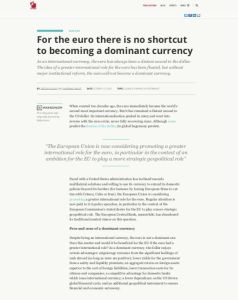
Recommendation
On its launch in 1999, the euro vaulted swiftly to its position as the world’s second leading currency, and flawed policies, the euro crisis and institutional miscues have kept it there ever since. The European Union is now mulling a more commanding global role for its currency, but as this scholarly report from experts Grégory Claeys and Guntram B. Wolff reveals, large-scale institutional reform is essential for the euro to compete with the US dollar for monetary preeminence and safe haven status.
Summary
About the Authors
Grégory Claeys is a research fellow at Bruegel, where Guntram B. Wolff serves as the director.
By the same authors
Article
Article
Report

























Comment on this summary